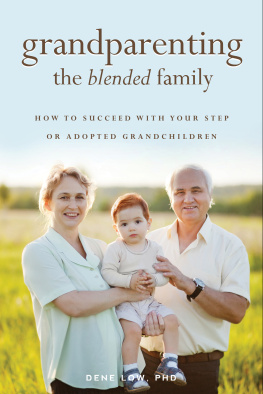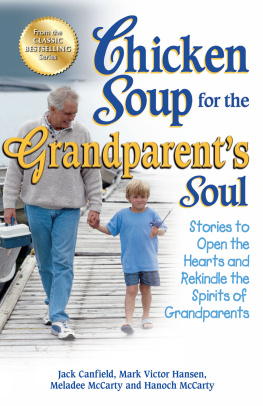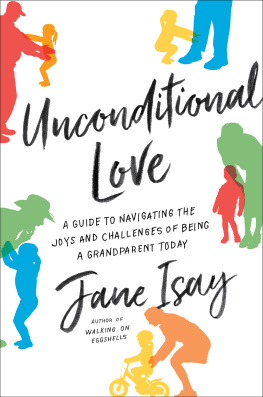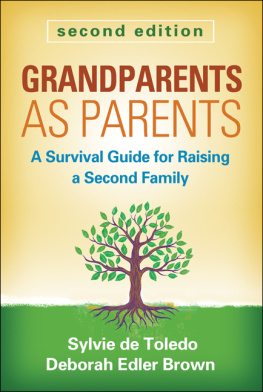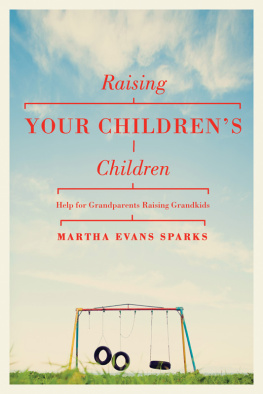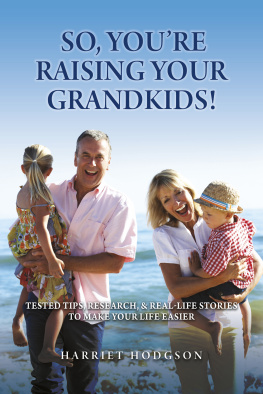

University of Regina Press designates one title each year that best exemplifies the guiding editorial and manuscript production principles of long-time Senior Editor Donna Grant.

Inside Skipped-Generation Families
Gary Garrison

2018 Gary Garrison
All rights reserved. No part of this work covered by the copyrights hereon may be reproduced or used in any form or by any means graphic, electronic, or mechanical without the prior written permission of the publisher. Any request for photocopying, recording, taping or placement in information storage and retrieval systems of any sort shall be directed in writing to Access Copyright.
Printed and bound in Canada by Marquis. The text of this book is printed on % post-consumer recycled paper with earth-friendly vegetable-based inks.
Cover design: Duncan Campbell, University of Regina Press
Text design: John van der Woude, jvdw Designs
Copy editor: Ryan Perks
Proofreader: Kristine Douaud
Cover art: Holding Hands by Darrya/iStockphoto.
Library and Archives Canada Cataloguing in Publication
Garrison, Gary, 1948 -, author
Raising grandkids : inside skip-generation families / Gary Garrison.
Issued in print and electronic formats. isbn 978-0-88977-554-1 (softcover). isbn 978-0-88977-555-8 ( pdf ). isbn 978-0-88977-556-5 ( html )
. Grandparents as parents.. Grandparenting.. Grandparent and child.. GrandchildrenCare.. Parenting. i . Title.
HQ759 .. G375 2018 .' C2018 - 903211 - C2018 - 903212 - X

University of Regina Press, University of Regina
Regina, Saskatchewan, Canada, s4s 0a2
tel: (306) 585-4758 fax: (306) 585-4699
web: www.uofrpress.ca
We acknowledge the support of the Canada Council for the Arts for our publishing program. We acknowledge the financial support of the Government of Canada. / Nous reconnaissons lappui financier du gouvernement du Canada. This publication was made possible with support from Creative Saskatchewans Creative Industries Production Grant Program.

To grandparents everywhere who raise grandchildren, and to everyone who shares themselves with younger generations to make a better future for everyone.
Relationships are the agents of change and the most powerful therapy is human love.
Dr. Bruce Perry, The Boy Who Was Raised as a Dog
Contents
introduction
one
two
three
four
five
six
seven
eight
nine
ten
eleven
twelve
thirteen
fourteen
fifteen
sixteen
Acknowledgements
Id like first to thank my partner Sara, whose love and kindness have inspired and revitalized me. Im grateful for the parenting I received from my parents, Donald and Amelia Garrison, and Im grateful for their parents as well, Pearl and Joseph Schott and Mose and Doolah Garrison.
For their support of my work on this book and for their work with grandparents and other caregivers, I thank Betty Cornelius and the entire cangrands circle, Drs. Andrew Bremness and Wanda Polzin and the other staff of casa Edmonton, grandparent support groups across the country, caseworkers in the child welfare system, the supervisors and politicians and journalists who are working to make the system better, and all the grandparents who are doing their best in difficult circumstances and the extended families who work with them.
Id like especially to thank everyone who agreed to be interviewed for this book, regardless of whether their contributions are reproduced below. I am grateful to the Alberta Foundation for the Arts and the Edmonton Arts Council for financial support, and to the Banff Centre for a magnificent and inspiring space to write. I am grateful to Bruce Walsh of the University of Regina Press for his confidence in me, as well as to others at the urp , including Sean Prpick, David McClellan, Ryan Perks, Donna Grant, and Kelly Laycock, all of whom helped see this project through to completion.
Authors Note
In the last thirty years, laws governing privacy and access to government information have not kept up with the social changes wrought by Facebook, Twitter, Instagram, and peoples ability to access data that moves at the speed of light. Some say the Earth is racing toward a catastrophe of massive coastal flooding, species extinction, and human self-destruction. Others claim the planet will heal herself and that our species will evolve to a place previous cultures reserved for angels and gods. Theres some truth in both viewpoints. Its also true that this brave new world has destroyed people like Rehtaeh Parsons, the Nova Scotia -year-old driven to suicide by cyberbullies. For good reason, its illegal to publicize the names of children without the consent of their caregivers, and there are good reasons for those caregivers to withhold consent.
I am committed to protecting the identities of the grandparents, parents, and children to whose lives I have had the honour to bear witness in these pages. In sharing their personal stories with me, they trusted me with their most precious possessions, and I have done my best to keep them safe.
The grandparents in this book have all been gagged to some degree. They know that if they told their stories publiclyon the evening news, say, or on the Internetthey would risk losing whatever government support they have. Indeed, the state could apprehend the very grandchildren they are sacrificing their lives to protect. Many are also afraid of further alienating their own sons and daughters, the parents of the grandchildren they are raising. And yet they are eager to speak up. They want to tell all grandparents who raise grandchildren that they are not alone, that they have no reason to be ashamed of the fact that their own children cannot or will not raise the babies they brought into the world. They want others to learn from their experiences of standing up for themselves against an impersonal, bullying system. They want to tell everyone, as I try in this book, that they are their neighbours and that they are proud of what they do, of the challenges, suffering, joys, sacrifices, and successes they experience in this retirement activity called grandparenting.
For these reasons I have chosen pseudonyms for the grandparents and grandchildren in this book unless they have insisted on putting their names out in public. Their identities are as sacred as their stories. But while their stories are for readers to witness, participate in, and see themselves in, their identities are for themselves alone.
Foreword
In my previous book, Human on the Inside , I talked about the nature of systems, how human beings need systems to frame how we live and interact and how at the same time these systems dehumanize us, turning us into mere customers, clients, inmates, files, bar codes, or pixels on a screen. In that book, my focus was the prison system in Canada, but all systemswhether its marriage, religion, criminal justice, income tax, education, health care, you name itembody the same principle. For us to be safe and healthy, whether as a community or as individuals, we need to find a balance between connecting with each other as persons and relying on systems that treat us as objects.
Next page

